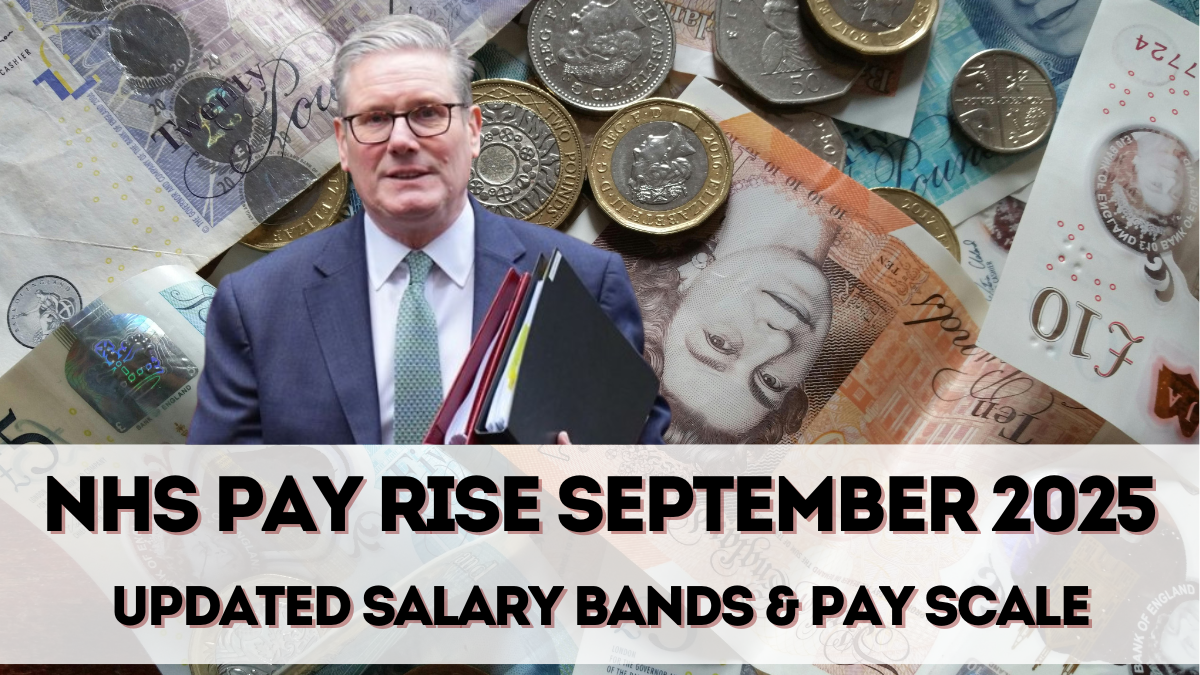The UK government has confirmed that NHS staff will receive a pay rise in September 2025, with updated salary bands across multiple roles. This adjustment reflects ongoing efforts to recognize the hard work of healthcare professionals who continue to provide critical services under immense pressure. The NHS salary update 2025 will ensure fairer wages, improve retention, and strengthen recruitment across the health service.

Why the NHS Pay Rise Matters
The pay rise is being introduced for several important reasons:
-
Inflation Impact: Rising living costs have reduced the real value of wages for healthcare staff.
-
Retention Issues: Many NHS workers have considered leaving due to low pay compared to private healthcare.
-
Workforce Shortages: Pay increases are essential to attract new doctors, nurses, and support staff.
-
Recognition: The government wants to acknowledge the contributions of NHS workers during recent health crises.
This pay rise is both a financial adjustment and a morale boost for frontline staff.
Updated Salary Bands for NHS Staff
The new pay structure applies across different roles and levels of experience. From September 2025, the updated bands include:
-
Band 2 (Support Staff): £22,000 – £23,500 per year
-
Band 3 (Senior Healthcare Assistants): £24,000 – £26,500 per year
-
Band 5 (Newly Qualified Nurses): £30,500 – £34,000 per year
-
Band 6 (Specialist Nurses/Paramedics): £37,000 – £42,500 per year
-
Band 7 (Advanced Roles): £44,500 – £51,000 per year
-
Band 8 (Senior Managers/Consultants): £52,000 – £71,000 per year
-
Doctors in Training: Starting at £32,000 per year, rising with experience
-
Consultants: £95,000 – £115,000 per year depending on service length
These bands ensure increases across the NHS hierarchy, with larger boosts for entry-level staff to encourage recruitment.
Impact on Different Roles
The NHS salary update 2025 will affect staff differently depending on their role:
-
Nurses: The pay rise aims to reduce the shortage of nurses, particularly in emergency and intensive care units.
-
Doctors: Junior doctors and consultants will see competitive increases to match private sector opportunities.
-
Support Staff: Porters, cleaners, and assistants receive long-overdue pay adjustments.
-
Paramedics: Given rising demand, paramedics are among the key beneficiaries.
This holistic approach ensures fairness across the health system.
How the Pay Rise Will Be Funded
The government has allocated additional funds in the 2025 health budget to cover wage increases. Funding sources include:
-
Reallocations within the NHS operational budget.
-
Government borrowing and taxation adjustments.
-
Efficiency measures to reduce waste in administrative areas.
The Department of Health and Social Care has reassured the public that frontline services will not face cuts to fund wage increases.
Reactions from NHS Staff and Unions
Reactions to the announcement have been mostly positive:
-
Unions: Welcome the increase but demand further adjustments to fully address inflation.
-
NHS Staff: Many view the update as overdue recognition of their service.
-
Critics: Some argue the rise is insufficient compared to pay levels in private healthcare.
Despite mixed opinions, most agree the NHS salary update 2025 is a step in the right direction.
Wider Benefits of the Pay Rise
The salary boost carries benefits beyond individual workers:
-
Improved Patient Care: Better pay can reduce staff turnover, ensuring consistent care.
-
Stronger Recruitment: Young graduates may now see NHS careers as more attractive.
-
Reduced Strikes: Wage improvements lower the likelihood of labor disputes.
-
Economic Stimulus: Extra income for thousands of workers contributes to the UK economy.
These outcomes highlight how salary updates contribute to both healthcare stability and national growth.
Challenges Ahead
Despite the pay rise, challenges remain:
-
Workload Pressure: Higher pay does not automatically reduce long hours and stress.
-
Regional Disparities: Cost of living varies across the UK, making pay less impactful in high-expense areas like London.
-
Future Adjustments: Inflation may require ongoing wage reviews.
-
Funding Concerns: Critics worry about the sustainability of rising NHS budgets.
These issues underline the need for long-term strategies alongside pay reforms.
What NHS Staff Should Do Next
NHS employees are encouraged to:
-
Review their updated contracts once new pay bands are issued.
-
Consult payroll departments for detailed breakdowns of increases.
-
Plan budgets to maximize benefits from higher salaries.
-
Stay engaged with unions for further updates on wage negotiations.
Awareness and preparation ensure staff benefit fully from the new pay structure.
FAQs
What is the new starting salary for NHS nurses in 2025?
Newly qualified nurses (Band 5) will earn between £30,500 and £34,000 per year.
Will consultants also get a pay rise?
Yes, consultants will earn between £95,000 and £115,000 annually depending on experience.
When does the NHS pay rise take effect?
The new salary bands take effect from September 1, 2025.
Does this pay rise cover support staff?
Yes, support staff in Bands 2 and 3 will see increases as part of the updated pay structure.
Will this end NHS staff strikes?
While the pay rise reduces tensions, unions may still push for further adjustments in the future.
Click here to know more.
